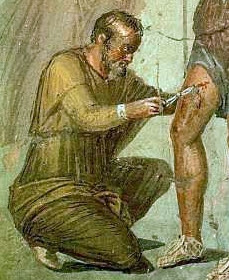Generally, seven is about the time I begin legging it around the hospital to check none of my patients look likely to die overnight when they're consigned to the tender care of the Hospital at Night con. As the Good Doctor pointed out, the fact that we junior doctors are now theoretically working far fewer hours does indeed mean that patients are put at risk; thankfully, where I am at least, no one has yet been kicked off the premises by management for staying past 5pm. (The downsides of this, of course, is that we routinely work long hours for far, far less money than even our underpaid equivalents of a decade or two received - and we have to pay for the diabolical accommodation - and that it has obliged the expansion of the allied healthcare professionals' roles into what should arguably remain medical).
Anyway, by and large this week has been good. My on-call last night was a bit hideous, as A&E was overflowing with patients, there were no beds in the hospital (thank you, the Department of Health), and it was so bad they were talking today about converting the physio gym into a temporary ward. At one point, I was going to cannulate a lady (Mrs. A) with an incarcerated hernia I'd been seeing and another lady (Mrs. B) opposite exclaimed "doctor!" and then launched into a two-minute tirade about how if she wasn't seen soon she was going to walk out and it was unacceptable. The nurse I was with, bless her, rolled her eyes at me and pulled the curtain round so I could get on with stabbing Mrs. A.
As I left the cubicle, however, a strange thing happened. Mrs. B called "doctor!" again, only this time it was to apologise. She was very sweet, saying things like 'it was uncalled-for' which were extremely surprising from anyone stuck in an A&E close to breaking point, never mind one in a part of the world where people would tell you to fuck off as soon as look at you. Unsurprisingly, this made me like her enormously, and so I told her it was fine, apologised for the wait, and we got along just fine after that.
So even the hellish on-call had its upsides, and Mrs. A had her hernia done late last night.
Tonight, however, amidst writing in the notes that I would prescribe some saline for a chap whose sodium was crashingly low (122, for those of you who get excited by such things) and then very nearly forgetting to do so, and filling in innumerable blood requests for the next morning's phlebotomists' (or "bleeders", as I like to call them) round, I heard a lady with a broad Irish accent address the senior sister (Karen) on the ward. Initially I wasn't listening particularly - she was talking loudly and had an accent uncommon in the area - but then I heard Karen say something like "if you don't want to be on this ward next time you come in, I can make a note of that in the admissions book".
This piqued my interest. Did this woman not realise that the hospital had no beds? This is not an unreasonable assumption - it has been all over the local news for the past two days that there are no hospital beds. The harridan with the woman then proceeded to say - really nastily - "I think we'll change the whole hospital next time. We won't come here again."
My initial reaction you will perhaps have guessed from my title - but the underlying issue is that people don't currently realise how lucky they are to have a national health service at all. Never mind that it's not a hotel, and never mind that treating Karen and hardworking staff like her as if they're shit because you've suffered some minor inconvenience is unacceptable. (As an aside, plenty of the staff here are anything but hardworking - but more on that later). What do these people think the alternative is? Is there a Special Hospital around the corner where their trivial tax payments are magically converted into their own private physician, caterer, and a master of ceremonies who ensures things happen at the moment they snap their fingers?
Given the average intake of narcotics round here, perhaps they do believe this - but they should go get a quote from the nearest private hospital and see how little leverage they'd have there. The worst part about it is, of course, that what you do not appreciate is not valued, and that which you do not value is soon lost.
-




No comments:
Post a Comment